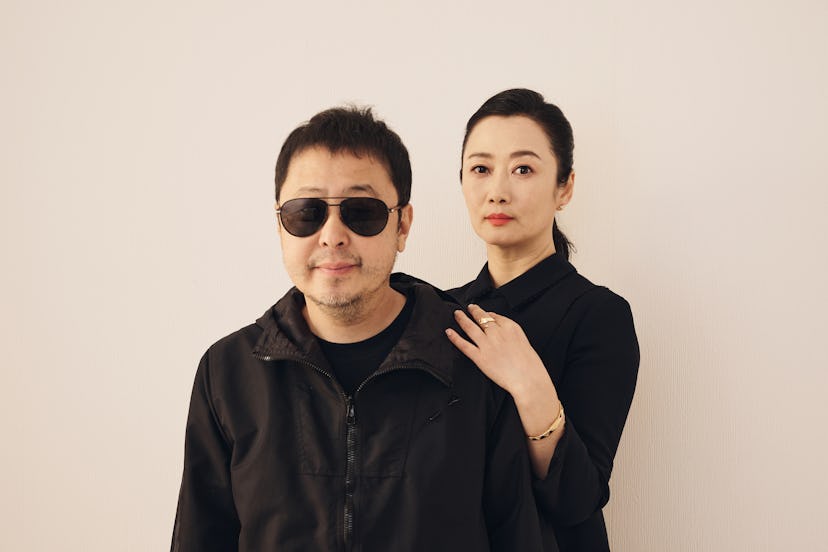Director Jia Zhang-Ke Talks His Latest Masterpiece & Mentoring the Next Generation of Filmmakers

At the Toronto Film Festival premiere of his ambitious film, Caught by the Tides, pioneering Chinese filmmaker Jia Zhang-Ke was feeling a bit jittery. “For me, this film is special,” he said through a translator during a press roundtable after the opening night screening. The deeply personal project, Jia's first full-length feature since 2020, was produced over a three-year period during the pandemic. “The world, in the meantime, has been evolving rapidly,” he continues. “Therefore I feel a little vulnerable to present this new film.”
But, one could say that this tour de force is the culmination of nearly 30 years of groundbreaking cinema by Jia, a leader of China’s edgy Sixth Generation of filmmakers. Established in the 1990s, that movement used gritty realism, low budgets, and underground filmmaking techniques to skirt increasing state censorship and explore contemporary socio-economic experiences in a rapidly modernizing China—and especially of those on the fringes of society.
For Caught by the Tides, Jia edited together unused footage spanning decades of his own work to create a sweeping—and mostly dialogue-free—story arc. Leading the film is Qiao Qiao, played by In Jia’s longtime on-screen collaborator and life partner, Zhao Tao. She journeys over 20 years through technological, industrial, and societal changes in the search for a long-lost love. Jia followers will recognize lush settings and Zhao’s pageboy bangs, velvet scrunchie, and butterfly motifs from 2006’s Still Life, his revolutionary (and Venice Film Festival Golden Lion award-winning) exploration of life disrupted by the Three Gorges dam project, and 2018’s Ash is the Purest White, which garnered his fifth nomination for the Cannes Golden Palm—amongst others.
“Despite being established as a master for 20 years, [Jia] doesn't fall back on what his old terms are. He’s constantly trying to innovate and to find new ways of expression,” says first-time feature filmmaker Rafael Manuel, whose short film Filipiñana won the 2020 Silver Bear Jury Prize at the Berlin International Film Festival. Over two years, Manuel formed close professional and personal bonds with Jia through the Rolex Mentoring Program, as part of the Swiss luxury watch brand’s commitment to supporting the arts. (Past program mentors have included Spike Lee, Carrie Mae Weems, and Lin-Manuel Miranda).
Jia Zhang-Ke and Rafael Manuel at the Toronto International Film Festival
Jia jokingly says a shared affinity for smoke breaks led to him handpicking Manuel as his “protégé.” But really, Filipiñana, which follows Isabel, a “tee-girl” who subversively questions conventions on the colonial vestiges of an elite golf course in the Philippines, left a “deep impression” on Jia.
“I noticed his precision, his excellent pacing,” says Jia. “I believe that every society is complex and has its own issues, and Rafael treats these subjects from his society through character and space.”
When Manuel visited China after pandemic lockdowns lifted, he shadowed Jia in the editing room for Caught By the Tides. Manuel reveled in combing through the director’s “personal archive” of signature long-shots and witnessing the evolution of his renegade filming techniques by viewing decades of footage. “It was a very personal experience and a generous act from him,” says Manuel. “All that actually inspired me to think about [building] my own archive, as well.”
Manuel later joined Jia on set to shoot new portions of the film. The two also spent quality time outside of work. “We were able to enjoy road trips together two or three times. We drove about [350 miles] to my hometown,” says Jia, as he playfully teases Manuel for frequently forgetting his passport for roadside checks. “It was dangerous sometimes, but it also felt quite thrilling.”
Jia later spent three days on-set in Manila with Manuel, helping him turn Filipiñana into a full-length feature. “[Jia] kept trying to push me to have more movement in my shots. To break away from what I was comfortable with and to explore, to experiment,” says Manuel, about Jia’s “intuitive” and “rock ‘n’ roll” style of editing and artistry during a Q&A moderated by TIFF CEO Cameron Bailey. “He said, ‘Rafael, you're still such a young filmmaker. Why are you trying to box yourself in a certain style?’ Slowly, I'm trying to.”
Call it kismet, but Jia had already influenced Manuel’s filmmaking even before the Rolex mentorship pairing. The London Film School graduate recalls flying back to Manila for pre-production on his 2020 award-winning short. He decided to watch Jia’s Ash is the Purest White, featuring a rousing sequence of club-goers dancing to the Village People’s “YMCA.” (Music is also integral to both directors’ storytelling and aligned personal interests.) “That was my introduction to Jia Zhang-Ke cinema: a 14-inch screen on the back of a seat,” says Manuel, who then proceeded to mainline Jia’s complete oeuvre.
“In my short film, Filipiñana, the end credit sequence of this girl dancing in a golf course…” continues Manuel. “I lifted that straight from Ash is the Purest White.”